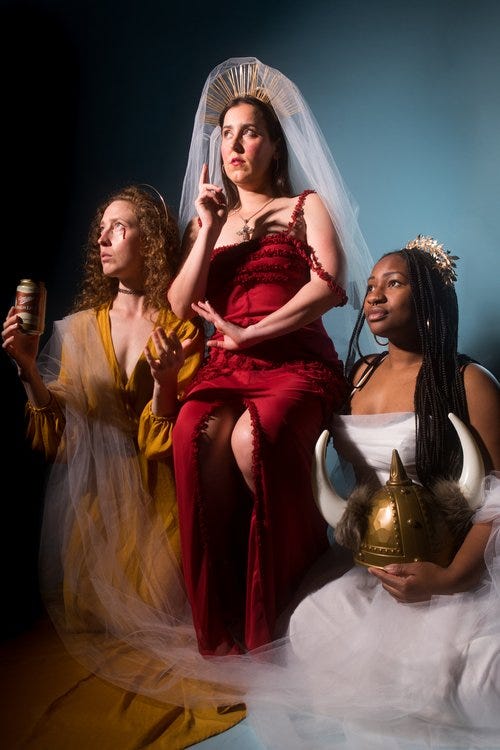Lightning Rod Special's Nosejob
A slipshod play with an unsure point of view. PLUS: Brooke Shilling's Pirate Queens and Emma McGill's Graveyard Shift
Lightning Rod Special’s Nosejob
by Lee Minora and Scott R. Sheppard
directed by Nell Bang-Jensen
Continuing through September 21st
Not recommended, with redeeming qualities.
This is sloppy work. Built from weak material, Nosejob is neither especially interesting, funny, nor provocative. It has effective moments, but often those do little or nothing to advance the dramatic action of the play. Taking place at a Catholic college between parties, a locker room, and the dean’s office, Lightning Rod Special delivers a confused take on campus sexual politics that seems to be unsure of its own point of view.

You-Shin Chen’s set is composed solely of blue lockers (and cabinets prepared to look like lockers) arranged into several banks, resembling a locker room but also the traditional wings of the proscenium, green turf carpeting, low ramps, and a few hanging tube lamps. The set bursts to life in the opening minutes of the show with enough doors hidden among the lockers to stage a farce. Other lockers are full of props, but there’s fewer gags in that than you might expect given the possibilities. The activation of these doors, a little slow-motion choreography (the show’s only choreographic trick), and Lee Minora, kneeling to pray at a candle-lit locker in a nun’s habit before delivering the opening line, “Y’know, I got fucked in that locker once,” set the tone for what follows. But that line goes beyond foreshadowing, so the ensuing flirtation and eventual locker fucking, is never surprising. It also makes no sense: you can’t fuck inside a locker.
Despite being set in the early 2010s, the script is riddled with anachronisms, including a reference to Brené Brown (whose rise to fame began 2010, though this may be a case of the “Tiffany problem,” where the reference feels more contemporary. I just doubt Brown was ubiquitous enough in 2013 to reach locker rooms) and seems to have no interest in excavating the idioms of the period. Too bad, as that would have added a layer of depth and nostalgia, not to mention both specificity and rich comic material, to a play about a millennial’s college days. Likewise, for a show set on a Catholic campus and with a B-plot about a Saint, there’s very little Catholicism. I didn’t notice any evidence for the specificity of the setting, neither time nor place, in the play, only in the promotional copy. There’s no YOLO nor Four Lokos here.
Nell Bang-Jensen’s staging is consistently flat when it’s not relying on bits of comic business, defaulting to having people standing in a line either center, or down-stage center, and facing the audience. I’ll forgive the downstage center sin, as the set pushes everything in that direction, but for flat staging you’ll have to go to confession—this is a three dimensional medium. In the play's very last moments it tries to amp up the spectacle, but this serves no purpose except as a button to end the play and cue applause.
Writer-actor Minora’s lead performance as Devon Chase, a millennial looking back on her college days, isn’t enough to save the material. Scott R. Sheppard and Matteo Scammell deliver strong performances as both coaches and Vikings, and as a trio of deans (joined by Alice Yorke). This is some of the tightest work in the show, as they question first Minora’s Devon, and later, Ciera Gardner (who delivers fine work here), but this scene is, again, downstage and flat, despite placing these administrators high up on a locker-platform.
Sheppard and Scammell get a lot of mileage out of a scene explaining consent to the football team (with the audience serving as the team), roleplaying a date. But this awkwardly, surreally, and uncomfortably shifts to one of sexual harassment, then a dream sequence-cum-monologue, and back to straight play with Devon talking to her friends. Yes, it's a memory play, but even that is disputed by another character taking over the narrative recollection for a scene or two. The show wants to make viewers uncomfortable as it leans into the contradictions that the play is exploring, but this sequence puts cracks in some of the play’s internal logic.
There’s a B-plot about a medieval Saint who cut off her own nose, which the last few scenes of the play rely upon, but this isn’t well integrated into the show’s structure. As part of this sequence, a pair of Vikings (antagonists to the Saint) appear and have a long, comic argument (a “dudes rock” kind of thing) wholly unrelated to anything else in the play, and the payoff is only a couple lines that suggest they're tired of raiding and pillaging. Leigha Kato is strong as Devon’s once-and-former friend, but has a bizarre scene of audience interaction (and the only significant bit of interaction in the show) which culminates in sitting on someone’s lap and calling him, anachronistically, “daddy.”
This wants to be a show about sexual assault on campus, rape culture, and rape. For the most part, it’s about someone being a shitty friend and not realizing it. A smart audience clues into why that's the case, as the show stages the moment of rupture in the relationship. But instead of making use of this bit of dramatic irony—we know something Devon doesn’t—the rest of the play sets it up as a big reveal where we're all supposed to figure it out at the same time over an hour later. Significantly, this choice also makes Minora’s protagonist much less likable. Nosejob wants to be a more-or-less conventional play while also having a free-flowing structure of loosely connected scenes that explore its themes. But Bang-Jensen and Lightning Rod Special don’t pull it off, giving us something that is neither lightning, lightning rod, nor special.

Pirate Queens
by Brooke Shilling
continuing on September 14th
Recommended
Pirate Queens is a rather good and very cute show that's missing a certain something to take it to the next level. A semi-biographical account of the life of pirate Mary Read (Brooke Shilling), and her adventures with Anne Bonny (Elena Nahrmann) and Calico Jack (Connor Hogan). For a pirate story, it's slightly light on adventure, though this is no deficit to the play.
One thing that might be missing is that Mary Read and Anne Bonny’s lives, told factually, just aren't really the stuff of drama. That the play succeeds so much, then, is a credit to Shilling, and in no small part thanks to the heavy use of theatrical conventions. Performed mostly on a 4’x5’ or so low platform (advertised as a 3x3 crate, which I have no qualms about), decorated with a still-creased pirate flag, Shilling, Nahrmann, and Hogan provide all the sound effects with their voices and bodies and mime every prop, making extensive use of a tricorn hat. These constraints are often incredibly productive, but at times I felt the absence of sound design or underscoring.
Another thing missing is light. Often there wasn’t enough front-light, leaving the actors faces—and eyes—unlit, making it difficult to connect with them (a shared lighting plot is one of the challenges working in a space like Cannonball). A sequence which breaks the convention of using the deck, exploding forward as Anne takes over the narration was a revelation while it lasted as it not only brought the actors forward on the stage itself, closer to the audience, but also into much more light. Not the only convention she breaks, Anne also casts members of the audience into her telling. While following the attempts of the audience participants to follow instructions, I lost a little track of the narrative, but that was probably fine. This rule-breaking is a very tidy meeting of character and form.
All three performers are strong, though Shilling is (maybe appropriately) restrained compared to Hogan and Nahrmann, who do great work filling in a whole bunch of other roles, including mom, husband, rich lady, army officer, and seating (is it still “miming” a prop if you are the prop?). The show is gleeful in having men play women and women play men, and Shilling’s Mary often talks about the “power” in transgressive gender performance, both in the literal sense that cross-dressing in the period provided freedom in how she moved through the world, but also something rather different when describing her encounters with Anne on the pirate ship.
This would be an excellent show for young audiences, or at least young adult audiences, with only the most minor of tweaks. Between the subject of pirates and a Theater of the Oppressed ending, it's almost begging for it. The audience participation would really sing, and the physical constraints of the show are a real asset for touring. Pirate Queens is a smart, tightly conceived and performed show about a fun slice of queer history and gender performance.
Graveyard Shift
written and performed by Emma McGill
directed by Sam Lane
Recommended, with qualifications
In a rushed 40 minutes, McGill performs as TV show host, contestant, daycare teacher, customer service rep, roller skating waitress, and a series of customers and supervisors. Competing in a game show hosted by Andy Cohen (in puppet form) to win “job sponsored health insurance,” McGill plays by going to work where hopefully she'll get health insurance.
This is a structure with promise, but there's the problem that she is both a) working to get insurance and b) competing in a game show where the prize is that same insurance. Bit of a causality paradox. The game show structure, complete with commercial breaks, is underutilized. When there's a break in the structure, and McGill is talking directly about grief, it goes unremarked upon despite the totalizing frame of reality TV. This is representative: there is a fair amount of material here about grief and loss (graveyard shift, get it?), a recurring theme (my condolences, to both the fictionalized and maybe actual Emma), but it's not really fully integrated or explored.
There's an appealing DIY aesthetic and bright color scheme that matches McGill’s energy. She is a strong performer, but tends to shift between only a few notes here. One of those is yelling. There's a lot of yelling. There's a fun roller skating lip sync, but it lacks a certain sharpness. The puppetry is static, lacking in expressiveness; Andy Cohen is a simple puppet, but he is held in almost the same way each time he's used.
There's satisfying sendups of condescending bosses, fun fantasies of telling off nasty customers, and a fun, fitting ending. The moral it's reaching for, that you have to cast off human connections in order to get ahead in this cruel system, doesn't quite stick its landing. There's much to like in Graveyard Shift, including McGill, and a service Shiba Inu named “Incluvisity,” but some of the audience seemed to enjoy the show more than I did.
If you’re keeping count, that makes 9 in a week. Next, we head into week two with Pig Iron’s Poor Judge.




